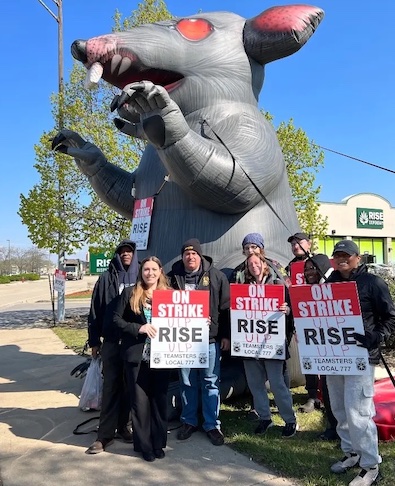* I’m assuming this will be immediately appealed since ten days ago the 7th Circuit US Court of Appeals denied an injunction pending appeal of a case that went the opposite way up north. From Southern District Court Judge Stephen McGlynn…
(C)an [the Illinois Protect Illinois Communities Act] be harmonized with the Second Amendment of the United States Constitution and with Bruen? That is the issue before this Court. The simple answer at this stage in the proceedings is “likely no.” The Supreme Court in Bruen and Heller held that citizens have a constitutional right to own and possess firearms and may use them for self-defense. PICA seems to be written in spite of the clear directives in Bruen and Heller, not in conformity with them. Whether well-intentioned, brilliant, or arrogant, no state may enact a law that denies its citizens rights that the Constitution guarantees them. Even legislation that may enjoy the support of a majority of its citizens must fail if it violates the constitutional rights of fellow citizens. For the reasons fully set out below, the overly broad reach of PICA commands that the injunctive relief requested by Plaintiffs be granted. […]
Assuming arguendo that there is no presumption of harm for an alleged violation of the Second Amendment, Plaintiffs still satisfy this element. For example, Barnett and Norman are no longer able to purchase any firearm, attachment, device, magazine, or other item banned by PICA, while Hoods and Pro Gun are now prohibited from selling said any item banned by PICA. These harms are irreparable and in direct violation of the Second Amendment right to bear arms in self-defense. There is no question that the right to armed self-defense is limited by PICA, and in some cases, may be prohibited altogether. It is true that not all items are banned under PICA; however, if a lawful citizen only possesses items that are banned under PICA, he or she would have to purchase a non-banned firearm in order to legally defend oneself under the Second Amendment. […]
Although Defendants challenged the veracity of Plaintiffs’ evidence, they were unable to produce evidence showing that modern sporting rifles are both dangerous and unusual. Consequently, Defendants failed to meet their burden to demonstrate that the “arms” banned by PICA are “dangerous and unusual” and thus not protected by the Second Amendment. See Bruen, 142 S. Ct. at 2128 (emphasis added). […]
Plaintiffs have satisfied their burden for a preliminary injunction. They have shown irreparable harm with no adequate remedy at law, a reasonable likelihood of success on the merits, that the public interest is in favor of the relief, and the balance of harm weighs in their favor. Therefore, the Plaintiffs’ motions for preliminary injunction are GRANTED. Defendants are ENJOINED from enforcing Illinois statutes 720 ILCS 5/24-1.9(b) and (c), and 720 ILCS 5/24-1.10, along with the PICA amended provisions set forth in 735 ILCS 5/24-1(a), including subparagraphs (11), (14), (15), and (16), statewide during the pendency of this litigation until the Court can address the merits.
The Court recognizes that the issues with which it is confronted are highly contentious and provoke strong emotions. Again, the Court’s ruling today is not a final resolution of the merits of the cases. Nothing in this order prevents the State from confronting firearm-related violence. There is a wide array of civil and criminal laws that permit the commitment and prosecution of those who use or may use firearms to commit crimes. Law enforcement and prosecutors should take their obligations to enforce these laws seriously. Families and the public at large should report concerning behavior. Judges should exercise their prudent judgment in committing individuals that pose a threat to the public and imposing sentences that punish, not just lightly inconvenience, those guilty of firearm-related crimes.
Stay tuned for react.
…Adding… Speaking of the Bevis case…
A Naperville gun shop owner is asking the U.S. Supreme Court to block Illinois’ assault weapon ban while he fights the law in federal court.
Robert Bevis is seeking an emergency junction, one week after a federal appeals court in Chicago turned down his request.
“This is an exceedingly simple case,” Bevis argues in his appeal, filed on Wednesday. “The Second Amendment protects arms that are commonly possessed by law-abiding citizens for lawful purposes, especially self-defense in the home.”
…Adding… Press release…
State Rep. Bob Morgan (D-Deerfield), the chief sponsor of the Protect Illinois Communities Act (“HB5471”), responded to the decision from U.S. District Judge Stephen McGlynn of the Southern District of Illinois in East St. Louis, after McGlynn issued an injunction against the Illinois assault weapons ban that was signed into law on January 10, 2023. The decision comes after U.S. District Judge Lindsay Jenkins, and U.S. District Judge Virginia M. Kendall, both out of the Northern District of Illinois, separately rejected similar requests for an injunction.
“This news is disappointing, but we remain encouraged as we’ve already had two federal judges in Illinois refuse to block the law,” said Rep. Morgan. “Since its enactment, this law has already prevented the sales of thousands of assault weapons and high capacity magazines in Illinois, making Illinois communities safer for families. This is necessary and life-saving legislation, and we feel confident we will ultimately prevail in a higher court.”
This conflict in rulings will now move the issue to the 7th Circuit U.S. Court of Appeals. This injunction does not impact the prohibition on rapid-fire devices, the interstate firearm trafficking strike force, or extension of the duration of a firearm restraining order established under HB5471.
Rep. Morgan serves as Chair of the Illinois House Firearm Safety Reform Working Group. He has seen firsthand the devastating effects that gun violence can have on a community. Highland Park, IL is a part of his 58th District, and he was present at the tragic Fourth of July mass shooting in 2022 during which 83 rounds were fired in less than 60 seconds, killing seven and injuring 48 people.
* G-PAC…
Today, the Gun Violence Prevention PAC (G-PAC) released the following statement from John Schmidt, a former U.S. Associate Attorney General and member of the Executive Board of G-PAC, in response to Southern District Court Judge Stephen McGlynn’s decision to enjoin the state from enforcing the Illinois’ assault weapons ban.
“Given comments he made from the bench at the hearing in East St. Louis on April 12, Judge McGlynn’s decision to rule against the Illinois ban on assault weapons and high capacity magazines is not surprising. But it is still disappointing. It is directly contrary to the prior decisions of two Chicago federal judges, Judge Virginia Kendall and Judge Lindsay Jenkins, both of whom found the new statute “constitutionally sound” and declined relief. We believe Judges Kendall and Judge Jenkins are right, and Judge McGlynn is wrong.
“Judge Kendall’s decision is already on appeal to the Seventh Circuit Court of Appeals, and that Court also declined to grant any immediate relief. We have confidence that the Attorney General representing the State of Illinois will take all possible actions to try to assure that the statute continues to remain in effect while litigation proceeds.”
*** UPDATE *** Attorney General Raoul has filed a motion with the Southern District to stay the preliminary injunction pending appeal…
The Court’s Preliminary Injunction Order is inconsistent with two prior rulings from two different judges in the Northern District of Illinois rejecting requests to preliminarily enjoin the Act on materially indistinguishable Second Amendment claims. See Bevis v. Naperville, No. 22- cv-4775, Dkt. 63, 2023 WL 2077392 (N.D. Ill. Feb. 17, 2023); Herrera v. Raoul, No. 23-cv-532, Dkt. 75, 2023 WL 3074799 (N.D. Ill. April 26, 2023). The Court’s Preliminary Injunction Order neither mentions nor analyzes why those two rulings on the same Act and the same type of Second Amendment claims were erroneous. They were not. The Seventh Circuit has also had the opportunity to enjoin the Act while considering the Bevis appeal, and it denied that request on April 18, 2023. Bevis v. Naperville, No. 23-1353, Dkt. 51 (7th Cir.) (denying motion for injunction pending appeal).
In order to avoid inconsistency and confusion—particularly given that refusing to stay the Preliminary Injunction Order would have the practical effect of overriding the Seventh Circuit’s contrary order in Bevis—this Court should stay its Preliminary Injunction Order while the Seventh Circuit considers the merits of the State Defendants’ interlocutory appeal. Furthermore, the Court should stay its Preliminary Injunction Order because: the Act does not violate the Second Amendment and Plaintiffs’ Second Amendment claims will ultimately fail on the merits; enjoining the Act inflicts irreparable harm on the public by allowing the weapons preferred by mass murderers to continue to proliferate; and the public interest favors allowing the Act’s restrictions on assault weapons and large capacity magazines to remain in effect.
I doubt it’ll work, but there you go.
26 Comments  
|
* Press release…
The Illinois Department of Financial and Professional Regulation (”IDFPR”) announced today it received 2,693 applications for the upcoming Social Equity Criteria Lottery (”SECL”). This lottery will distribute the next round of 55 conditional adult use cannabis dispensary licenses across the 17 Bureau of Labor Statistics (BLS) Regions. The list of applicants participating in the SECL may be found on IDFPR’s website here. Applicants are encouraged to review the list and confirm that they have been properly listed for any BLS Region in which they applied. The SECL will be conducted by IDFPR with the Illinois Lottery in early- to mid-May. The date will be announced by IDFPR as soon as possible.
“Our simplified online application process increased the accessibility for individuals of all backgrounds and from all over Illinois to have the opportunity to write the next chapter of the most equitable cannabis industry in the country,” said IDFPR Secretary Mario Treto, Jr. “As part of the Pritzker Administration, we are committed to ensuring Illinois’ cannabis industry continues to set the gold standard for social equity and that it continues to flourish to create additional resources for communities and individuals across the state.” […]
Following the lottery, each applicant selected will have 45 calendar days to prove certain social equity eligibility criteria in order to receive a conditional license. […]
IDFPR will have at least 60 calendar days after the lottery to ensure the 55 applicants selected in the lottery meet the criteria detailed above. Applicants selected in the lottery will be provided an opportunity to provide supplemental information to satisfy these criteria if needed. If an applicant selected in the lottery does not provide the supplemental information, the conditional license will be offered to the next applicant drawn in that BLS Region, who must then meet the social equity eligibility criteria.
* More from Green Market Report…
That’s almost three times the number of applicants that competed for the 185 licenses that were up for grabs in lotteries held two years ago. […]
Under the new rules, gone are the lengthy applications that required extensive business plans, covering everything from security to operations, which ran thousands of pages and cost many applicants thousands of dollars to complete. The cost to submit an application also dropped from $2,500 to $250.
Perhaps the biggest change is allowing only one application per applicant, leveling the playing field and increasing the number of people or groups who would receive licenses. In the previous lotteries, 937 applicants who submitted 4,000 applications competed for 185 licenses. Under the new criteria, about 2,700 applicants will compete for 55 licenses. […]
Only applicants who win a lottery pick to receive a license will then have to prove they meet the criteria. One of the complaints about the prior process was that applicants spent thousands of dollars to apply and meet the standards for ownership only to lose out on the luck of the draw.
* WBEZ has a story on higher education and the cannabis industry…
Ascend Wellness Holdings, a multi-state operator with a large grow facility in Barry, Ill., works with Western Illinois University in Macomb. […]
People have a lot of class choices in the Western program. Horticulture 357, Cannabis Production, is one of three core classes students have to take. But they can also choose from electives such as hydroponic plant production and crop biotechnology.
The production minor also requires a three-hour practicum, where students volunteer at facilities like those at Ascend or Nature’s Grace. Hennings said the idea is to integrate students into an actual operation as they’re getting ready to graduate with the skills the cannabis industry wants.
* Scabby the Rat also made a picket-line appearance…
As workers at three local marijuana dispensaries, including two in Joliet, continue to strike, the employees have gotten support from an Illinois state senator who says the workers deserve a share of the more than $ 1 billion in pot profits they are helping to produce.
Sen. Rachel Ventura (D-Joliet) said that pot sales in Illinois generated $1.5 billion in 2022 and that employees at RISE dispensaries who went on strike last week over the lack of a fair contract should benefit from those profits.
In Fiscal Year 2022, Ventura said that Illinois cannabis sales generated $466.8 million in state taxes on the $1.5 billion in sales. Illinois total dispensary sales reached over three billion in total over the last three years, she said.
Workers at the dispensaries in Joliet and Niles went on strike last week after months of negotiating for a fair contract and are seeking better wages and retirement benefits, representatives from Local Teamsters 777 said. The last straw came, union officials said, when employees were forced to remove pins they were wearing calling for a fair contract by officials from Green Thumb Industries, which runs the dispensaries.
More…
“This is the first cannabis strike in the country,” James Glimco, president of Lyons-based Teamsters Local 777, said Wednesday as he joined striking workers at the Rise dispensary near the Louis Joliet Mall.
Workers are seeking a contract agreement with higher wages, improved retirement benefits, and better access to health insurance.
Starting hourly wage at the dispensaries is $16.50, and the union wants to raise it to $19. […]
But there have been no contract negotiations since the strike started, he said.
“They’re playing hardball,” Glimco said. “I hear they’re advertising trying to hire people.”
Here’s Scabby…

…Adding… Excerpt from Rep. Larry Walsh’s statement…
The owners and operators of the RISE Dispensaries last year reported more than $1 Billion in revenue last year and a 14% growth in profits. Those profits were made due to the efforts of these workers. I fully support and stand in solidarity with their incredibly brave decision to fight for better wages and benefits. […]
It doesn’t matter if you are a machinist, carpenter, teacher, plumber, or a dispensary employee. If you work here in Illinois you deserve a fair day’s wage for a fair day’s work. That is what this country was built on and union organization, negotiation, and, as a last resort, strikes are what will continue to support and revitalize the middle class in these difficult post-pandemic times.
* And the latest episode in the series “Growing Belushi” has a Shelbyville angle…
Chris sells Jim on buying a “turnkey facility” in Illinois, but the operation turns out to be growing bunk weed and will need a complete overhaul.
From from Redditt…
The episode went into great detail about the tons of improvements they put into the center, including a radiation remediation machine that costs a cool $400k! They also upgraded lights, HVAC, Vertification and better waste water management.
LA Weekly…
We asked Belushi what going national meant to him. Was it licensing intellectual property? Setting up gardens in other states?
“Lot of it is licensing. But vetting out the growers and the companies,” Belushi explained. “We got a great opportunity and Shelbyville, Illinois, taking over indoor grow that was a charity grow, all the profits go to charity. And we are taking that over and actually kind of doing like a Bar Rescue of like going into this girl upgrading everything and it becomes a Belushi Farms in Illinois. So we’re going to be growing in Illinois. We’re growing in Oregon and we’re licensing other places, other states, and possibly growing in Albania.”
From the show…
…Adding… I’m told by an expert in the field that Belushi was exaggerating about Illinois law. “Some failures are immediate destruction, other test failures can be remediated. The testing rules outline the options.”
12 Comments  
|
Better management, please
Friday, Apr 28, 2023 - Posted by Rich Miller
* Northwestern University political scientist Wesley G. Skogan’s new book Stop & Frisk and the Politics of Crime in Chicago is the subject of his WBEZ interview…
Q: These traffic stops became the Police Department’s main way of seizing illegal guns. Block Club Chicago and Injustice Watch have found that, since 2015, CPD has carried out 4.5 million traffic stops. In 2021, the most successful year for seizing weapons during those stops, the police made 156 traffic stops for every gun arrest. What are the effects of making so many stops for one gun arrest?
Skogan: One of the consequences of this enormous number of unwarranted stops — stops of innocent people — is that they come away with a very sour taste in their mouth. What they discover is that police officers don’t want to listen to what they have to say and the officers push them around and shout at them, even though they find nothing. What the people walk away with is a very bad experience, which undermines their trust in police and undermines the legitimacy of the police in Chicago.
And that has consequences. The Chicago Police Department’s real problem, starting in the early 2010s, was the collapse of its ability to solve shootings and homicides. The number of those crimes for which they recover a gun, find a suspect, make an arrest, make what’s called a crime clearance — it began to plummet. It’s now extraordinarily low. And that limits the capacity of investigators — the detectives — to do much about crime. And because no one has been arrested, that leads many community members to conclude that the police aren’t trying hard, that they’re not paying attention to the lives of people like them, that they are not being protected.
* Skogan’s advice to the incoming mayor…
The arrival of a new mayor and police superintendent is an opportunity for some new thinking about policy. We know a lot about things that will reduce crime in the streets. Chicago has already started to mount a pretty effective campaign using violence interrupters and related community organizations that provide services and support for young men who are in trouble. More of that is always welcome.
We also know that a focused deterrence strategy — which drops the idea of stopping hundreds of people to deter one little crime and focuses instead on a very small network of high-risk, high-offending people — is a much more effective way to get more bang for your stops and more bang for your investigations. So, the incoming mayor should focus on this detective-oriented police work.
Efforts to rebuild Chicago’s Black community are also really important. That community has been getting poorer and more isolated over time. Some dramatic action to try to bring Black Chicago back into the mainstream of city economic life is absolutely important.
The Center Square, meanwhile, posted an opposing view written by a communications intern at The Heartland Institute. So helpful.
* Speaking of the police…
As a newly formed commission launches a nationwide search for the Chicago’s next top cop, campaigns endorsing current and former Chicago police officials for the job are already impacting the process and raising some alarms.
The first-of-its-kind search by the Community Commission for Public Safety and Accountability has so far centered on three public meetings that have elicited seemingly coordinated efforts to raise the profile of certain police supervisors, including at least two who are also being pushed in online campaigns.
Anthony Driver Jr., the commission’s interim president, said those efforts are complicating the search, which relies on getting independent input from residents. […]
“We’re looking for the person to do the job, so community members’ voices are very important and their voice will be at the forefront,” he added. “But if somebody has 5,000 supporters and another person has 20 [and] the person with 20 seems way more qualified, then that’ll create an issue.”
One of the candidates even appeared in a campaign-style video. But, is it really all that unhealthy when members of the public speak up for their local commanders? We’ve seen plenty of mediocre (and worse) people chosen by “experts.” Then again, I can most definitely see where this could really get out of hand. Your thoughts?
…Adding… From David Axelrod’s interview of Brandon Johnson on what he’s looking for at
CPD…
Right now, we have supervisors who supervise the supervisors, you have police officers that will have a different supervisor, sometimes three to four in one week. Now granted, they all might be part of a cadre of law enforcement but you know, every supervisor brings a different element. Right? And so having some consistency around supervision is really important, and having a superintendent who understands what it means to be compassionate, collaborative, and someone who was competent. That’s what what I’m going to look for, and that’s what we’re going to find to serve as superintendent in the city of Chicago. I’m very confident that we’re going to find someone that gives confidence to the rank and file but also understands constitutional policing.
…Adding… Final results map…
* Isabel has some Chicago-related stories in her morning briefing, but she rounded up some more for this post…
* Tribune | What to know as Brandon Johnson prepares to become Chicago’s next mayor: Since winning election this month, Johnson has been assembling a transition team, traveling to Springfield to meet with lawmakers in the Illinois General Assembly to lay out his hopes and goals for his first term and picked his chief of staff.
* NBC Chicago | Brandon Johnson Reveals the Advice He Received From Former President Obama: “We spent a lot of time talking about our families,” Johnson said. “Here’s someone that was president of the United States, was an organizer and worked as a legislator, (but) he raised his family too.”
* Sun-Times | Frank Annunzio, who represented Chicago in Congress, was linked to the mob, his FBI file shows: The records — released in response to a public records request and now part of the Sun-Times’ “The FBI Files” online database — also reveal there was a years-long federal investigation into a “proposed bribery scheme” described as having focused in part on Annunzio. That investigation was closed in the mid-1980s without any criminal charges, the files show.
* Tribune | California launches legal battle with railroads that could lead to reduced train emissions in Chicago: The California Air Resources Board voted unanimously to require railroads to cut diesel soot emissions from passenger, freight and industrial locomotives by 91% by 2050 and to slash smog-forming nitrogen oxides, or NOx, by 86%.
* Sun-Times | First night meeting of the Chicago Fishing Advisory Committee draws new voices: Illinois’ assistant fisheries chief Kevin Irons said they are in the process of hiring two people to replace Brenda McKinney, who retired last year, with plans to expand the Urban Fishing program; hybrid bluegills will be stocked in the Chicago lagoons but not channel catfish; and he reminded about the fishing equipment loaner program that about 150 libraries are doing statewide.
* WBEZ | After death of Emmett Till’s accuser, Chicago-area cousin says, ‘No one now will be’ held accountable: “Our hearts go out to the family of Carolyn Bryant Donham,” Parker, of Summit, Illinois, said in a statement. “As a person of faith for more than 60 years, I recognize that any loss of life is tragic and don’t have any ill will or animosity toward her. “Even though no one now will be held to account for the death of my cousin and best friend, it is up to all of us to be accountable to the challenges we still face in overcoming racial injustice.”
* Block Club | These Humboldt Park 5th-Graders Are Spreading Awareness About The Need To Protect Rainforests: A group of 10- and 11-year-old students at Casals School of Excellence, 3501 W. Potomac Ave., studied rainforests around the world for an expeditionary learning project this school year. The students then launched a multi-faceted campaign around safeguarding rainforests, urging the school community to do its part.
* Crain’s | Meet the photographer capturing iconic images of the Chicago skyline: Some of the most iconic images of the Chicago skyline would not exist if Barry Butler hadn’t broken his collarbone during a hockey game some 25 years ago.
16 Comments  
|
* Tribune…
A federal jury deliberated for a third day Thursday without reaching a verdict in the “ComEd Four” trial alleging a group of executives and lobbyists conspired to bribe then-House Speaker Michael Madigan to win his influence over the utility’s legislative agenda in Springfield.
So far, the panel of seven women and five men has deliberated for about 15 hours over three days. They will take Friday off, as has been the schedule throughout the seven-week trial, and resume discussions Monday morning.
The only communication from the jury Thursday came in the form of three notes asking for transcripts of the recorded phone calls and meetings at the center of the case. The jurors also sent a note asking how much Juan Ochoa was paid while on the ComEd board.
Ochoa testified it was about $80,000, but U.S. District Judge Harry Leinenweber responded that they should rely on their collective memories.
* One of the transcripts jurors requested…
That was the much-anticipated meeting when ComEd CEO Joe Dominguez was finally briefed about the Madigan subcontractors by Mike McCain and Fidel Marquez. McCain and other defendants were worried that Dominguez, a former Assistant US Attorney, wouldn’t approve of the scheme. But Dominguez said he was “fine” with it, although he was under the impression that the subcontractors could be deployed by the company in a pinch. Dominguez was never charged, but things did get a little rough for him on the stand…
Dominguez grew annoyed with Bhachu’s line of questioning and accused the prosecutor of taking his words out of context.
“As you full well know, I went on to tell Mr. Marquez that ‘Everything we do here needs to be on the up and up,’” Dominguez said.
Dominguez then attempted to tell the court what Bhachu allegedly told him during that September 2019 proffer meeting, but Bhachu quickly cut him off.
“If you’re going to start talking about what I said, you might want to not do that because it might not work out well for you,” Bhachu said before telling Judge Leinenweber that Dominguez was out of line in bringing up their conversation. “What I said is inadmissible.”
The dust-up elicited accusations from the defense attorneys that Bhachu was threatening a witness.
* But was the jurors’ request significant? Maybe not…
The jurors also asked for “at least two transcript binders.” As the Tribune’s Jason Meisner quipped, “It’s fairly clear from this question that we should not be on the edge of our seats for a verdict today.”
Jurors return Monday.
*** UPDATE *** Crain’s…
What about other executives at ComEd and parent Exelon who not only knew of parts of the alleged scheme and did nothing to stop it, but also signed off on key elements?
As part of his final address to jurors, lead prosecutor Amarjeet Bhachu provided an answer: No one at the utility or its parent, except Pramaggiore, had the full view of the pile of favors being done for Madigan. […]
In a slide shown to jurors as Bhachu discussed the issue, the names of the three were shown with this comment: “1. ‘The question is whether the defendants had corrupt intent — not someone else.’ ”
“None of those folks had the full picture,” Bhachu said.
20 Comments  
|
|
Comments Off  
|
|
Comments Off  
|
|
 Support CapitolFax.com
Support CapitolFax.com
Visit our advertisers...

 ...............
...............
 ...............
...............
 ...............
...............
 ...............
...............
 ...............
...............
 ...............
...............
 ...............
...............
 ...............
...............
 ...............
...............


|
   
|
Hosted by MCS
SUBSCRIBE to Capitol Fax
Advertise Here
Mobile Version
Contact Rich Miller
|




















